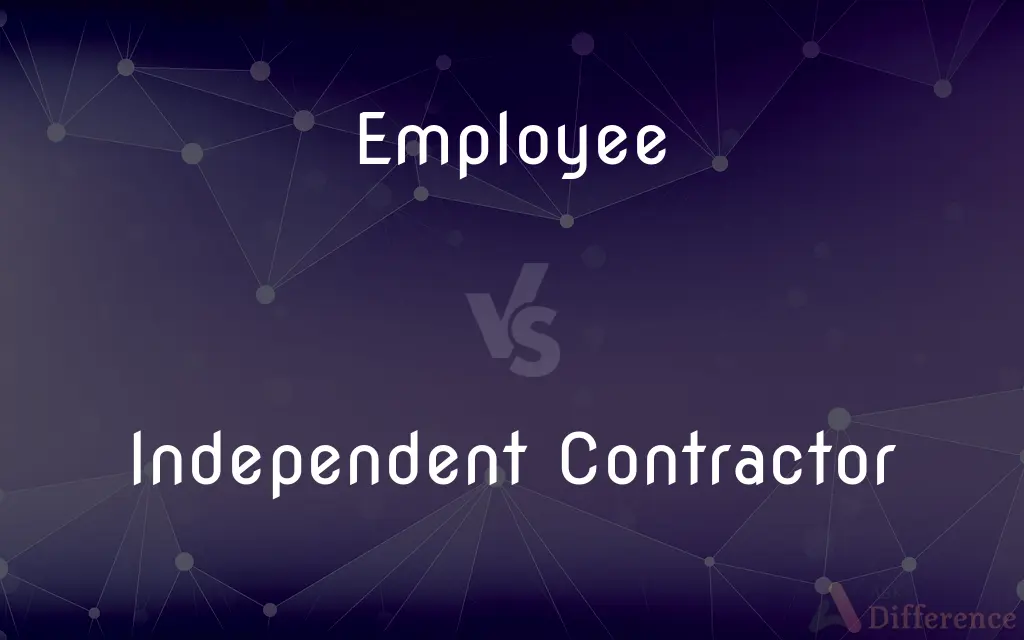Employee vs. Independent Contractor — What's the Difference?
By Tayyaba Rehman — Published on October 21, 2023
An Employee is hired under an employment contract with benefits, while an Independent Contractor offers services under a contractual agreement without typical employment benefits.

Difference Between Employee and Independent Contractor
Table of Contents
ADVERTISEMENT
Key Differences
An Employee typically works for one employer, often on a long-term basis, and is subject to the employer's business rules and benefits. On the other hand, an Independent Contractor usually provides specialized services for multiple clients and operates under terms defined in a contract.
While an Employee is often entitled to benefits like health insurance, paid leave, and retirement contributions, an Independent Contractor generally does not receive such benefits and is responsible for their own taxes and insurance.
For businesses, hiring an Employee means taking on more responsibilities, including payroll taxes and providing workplace protections. In contrast, working with an Independent Contractor translates to less administrative burden, as they are considered a separate business entity.
Employees are typically integrated into a company's culture and are expected to align with its values and long-term goals. Independent Contractors, however, maintain a degree of separation, focusing on the delivery of a specific service or project as agreed upon.
While both Employees and Independent Contractors contribute to the business landscape, their legal and financial implications differ. It's essential for both parties to understand their roles to ensure legal compliance and meet mutual expectations.
ADVERTISEMENT
Comparison Chart
Nature of Relationship
Long-term and subjected to employer's rules.
Contractual and project-specific.
Benefits
Often entitled to health, paid leave, etc.
Typically does not receive employment benefits.
Tax Responsibilities
Taxes are withheld by employer.
Responsible for own taxes.
Integration
Integrated into company culture and long-term goals.
Maintains separation; focused on service delivery.
Control
Employer controls how work is done.
Has more control over how to accomplish their work.
Compare with Definitions
Employee
An individual working under an employment contract.
John became an Employee of the tech firm last year.
Independent Contractor
Hired based on expertise for a specific project or time frame.
They decided to engage an Independent Contractor for the software upgrade.
Employee
Part of an organization's workforce.
The Employee received a promotion for his outstanding work.
Independent Contractor
A self-employed individual hired for specific tasks.
The company brought in an Independent Contractor for the marketing project.
Employee
A person working for another in return for financial compensation.
The new Employee orientation is scheduled for next week.
Independent Contractor
Not bound by typical employee benefits or controls.
As an Independent Contractor, he enjoyed a flexible schedule.
Employee
A person hired for a wage or salary.
She was the most dedicated Employee in her department.
Independent Contractor
A professional offering services under a contractual agreement.
Sarah worked as an Independent Contractor for several tech startups.
Employee
Someone subject to an employer's rules and benefits.
Every Employee must adhere to the company's dress code.
Independent Contractor
Operates as a separate business entity.
The Independent Contractor issued invoices for her services.
Employee
A person who works for another in return for financial or other compensation.
Employee
An individual who provides labor to a company or another person.
One way to encourage your employees to work harder is by giving them incentives.
Employee
One employed by another.
Employee
A worker who is hired to perform a job
Common Curiosities
Who has more control over the work process?
Employers have more control over Employees, while Independent Contractors have more say in how they accomplish their tasks.
Can an Independent Contractor work for multiple clients?
Yes, Independent Contractors often provide services to multiple clients simultaneously.
How are disputes typically resolved for each?
Employees might follow company grievance procedures; Independent Contractors would refer to their contract terms.
What's the main distinction between an Employee and an Independent Contractor?
An Employee works under an employment contract with benefits, while an Independent Contractor provides services under a specific agreement without standard employment benefits.
Are Independent Contractors eligible for company benefits?
Typically, Independent Contractors do not receive the benefits that Employees do, such as health insurance or paid leave.
Is it cheaper for companies to hire Independent Contractors?
While Independent Contractors might save on benefits costs, the overall cost depends on the contract terms and the nature of the work.
Who is responsible for taxes in each arrangement?
For Employees, employers withhold taxes; Independent Contractors handle their own tax obligations.
How is job security compared between the two?
Employees typically have greater job security, while Independent Contractors' engagements are often project-specific.
Are Independent Contractors protected by employment laws?
Many employment laws cover Employees but may not extend to Independent Contractors.
Can an Employee also work as an Independent Contractor?
Yes, an Employee can also take on roles as an Independent Contractor outside their employment, provided no conflicts of interest arise.
What factors determine the classification of an individual?
Factors include the level of control, financial arrangements, relationship type, and how work is performed, among others.
Can an Independent Contractor become an Employee?
Yes, companies can offer full-time positions to Independent Contractors if both parties agree.
Who provides the tools or equipment for the job?
Employees often use the company's resources, whereas Independent Contractors might use their own.
What's crucial for companies to avoid misclassification?
Understanding the legal definitions of Employee and Independent Contractor and ensuring roles and relationships align with these.
How does training differ between the two?
Companies often train Employees, but Independent Contractors are expected to have the necessary skills upon hire.
Share Your Discovery

Previous Comparison
Report vs. Proposal
Next Comparison
Merchant Bank vs. Development BankAuthor Spotlight
Written by
Tayyaba RehmanTayyaba Rehman is a distinguished writer, currently serving as a primary contributor to askdifference.com. As a researcher in semantics and etymology, Tayyaba's passion for the complexity of languages and their distinctions has found a perfect home on the platform. Tayyaba delves into the intricacies of language, distinguishing between commonly confused words and phrases, thereby providing clarity for readers worldwide.














































